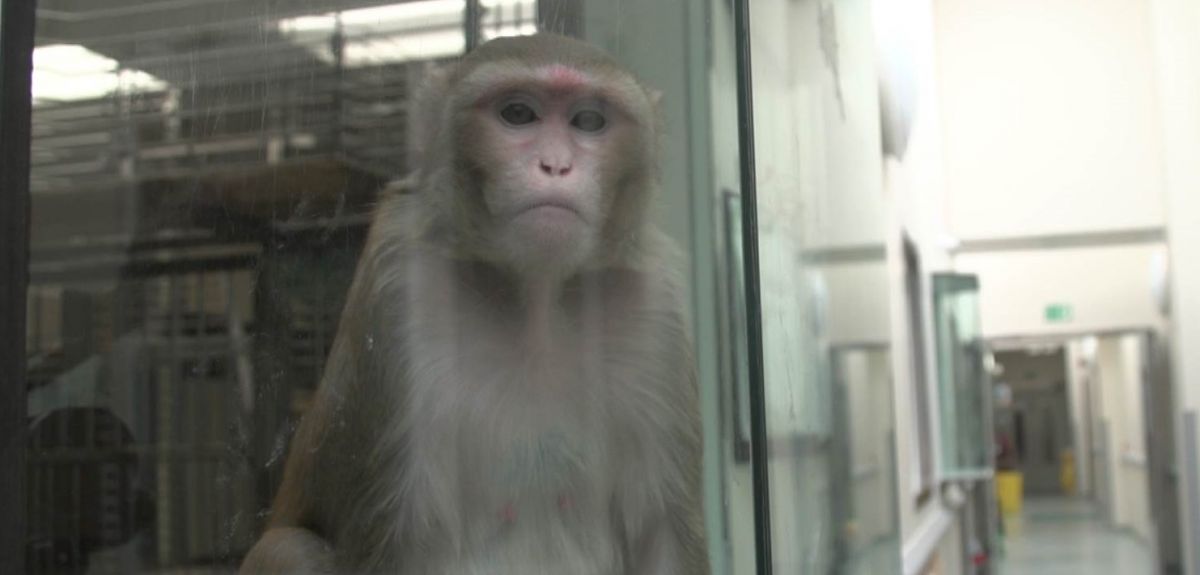
New programme to investigate the workings of the mind
As Oxford signs up to a national Concordat on openness in animal research, a new £5m programme of studies of primates is launched. The Wellcome Trust-funded programme will help us better understand human brain processes and how they are impaired in disease.
A new research programme investigating how the brain supports complex mental processes and informing our understanding of the mind in health and disease is to receive £4.95m from the Wellcome Trust over five years.
The studies in primates will look at how networks of millions of neurons in the brain give rise to key functions like attention, social interaction, decision-making and organisational skills – functions often impaired in mental health conditions, in dementia and normal ageing, and after head trauma or a stroke.
The announcement comes as Oxford signs up to a new nationwide Concordat on openness on animal research. The Concordat aims to help the public understand more about how animals are used in biosciences research and the benefits such research can bring.
The new Wellcome Trust-funded programme will bring together a range of scientists, vets and animal technicians and involve 20 macaque monkeys. Importantly, a core stream of this programme will involve research into animal welfare to guide the best ways of conducting this type of research.
The research will be embedded within existing Oxford neuroscience research programmes in humans to ensure a direct link to understanding human brain processes and their impairments in disease.
The research programme is one of the first to be highlighted under the new Concordat on openness. Both Oxford and the Wellcome Trust are among the Concordat's 72 signatories, who also include other leading universities, charities, commercial companies, research councils and learned societies. All have pledged to be clear about when, how and why they use animals in research. They agreed to provide accurate descriptions of the research, realistic information about its potential benefits and open discussion of the ethical and welfare considerations.
Oxford has been in the forefront of the drive for greater openness about research involving animals. Detailed pages on the University website explain our policy on the use of animals. We also give case studies in which scientists explain the purposes of their research and how this can only be achieved with the use of animals. Earlier this year, the University gave the BBC unprecedented access to Biomedical Sciences Building. Journalists filmed research involving primates and explained how it had helped Oxford scientists to pinpoint decision-making areas of the brain.
The Concordat also aims to explain why animal research is necessary and cannot be achieved by other methods. The new programme at Oxford is a good example. Our mental processes and cognitive activity are constructed by complex, distributed networks of neurons in the brain – allowing us to process information, focus our attention, make decisions, carry out tasks, interact with each other, and many other functions. Brain imaging in humans has given us large-scale maps of how these networks are laid out. But these methods aren't able to tell us how the neural networks actually work.
The new research programme will combine MRI brain imaging with fine-scale neuroscience techniques only possible in animals to probe how different parts of the brain interact with each other. Primates will be used in this research programme because of the focus on complex cognitive functions, which depend on brain circuits not shared with other species such as mice and rats.
The welfare stream of the research programme will involve developing better measures of the macaques' health and wellbeing for best possible practice in animal care.
The best animal welfare doesn’t just mean using anaesthetics and painkillers for invasive procedures, or making sure techniques cause minimum discomfort. It is also about understanding what choices on housing, training, and rewards are best for the health and wellbeing of the monkeys; for example, the best methods of training to reduce stress and ensure rapid learning of tasks. This requires having good physiological and behavioural measures of animal health, and long-term monitoring through the duration of a research programme.
The programme, funded through a competitive peer-reviewed grant award process, has received ethical approval and is licensed by the Home Office. The macaques will be housed in state-of-the-art facilities in the Biomedical Sciences Building, where they can express their natural behaviours – such as living in social groups, playing, climbing and foraging for food.
The MRI imaging will be used in the same way as in human studies to map networks and connections between different areas of the monkey brain. Importantly, the latest methods will also be used to record the electrical activity of neural circuits in the brain, as well as powerful new techniques for altering function in one part of a network and measuring consequences elsewhere.
Electrical activity in the brain's circuits is recorded using implanted electrodes similar to those used to record brain activity in some patients with epilepsy, or in deep brain stimulation in Parkinson's disease. The type and amount of brain activity data that can be obtained with these electrodes means that very few animals are needed in these research studies.
Other methods the researchers will use to probe the functioning of neural circuits in the brain include optogenetics, a state-of-the-art technique that is only just beginning to be used in primates having seen success in fruit flies and mice. Optogenetics involves introducing light-sensitive molecules into small groups of specific nerve cells and using light to cause those nerves to fire.
'We need to understand more about how our brain works, both when it is working well and when it isn't. This is important fundamental research into the brain that will benefit humans and may lead to medical advances in the medium to long term,' says Professor John Duncan of the Department of Experimental Psychology at Oxford University and lead researcher on the new Wellcome Trust strategic award.
Professor Duncan will be working with 10 other principal investigators from the Department of Experimental Psychology, Department of Physiology, Anatomy and Genetics, and Biomedical and Veterinary Services.
He says: 'While we know more than we ever have about the overall organisation of neural circuits in the human brain, it is critical to know how these circuits actually work. One vital question is how different parts of a circuit communicate with each other to build complex mental activity. On top of all that we can learn from studies in humans and computer simulations, it is only studies in animals can get at the detailed mechanics of neural systems. This will be critical in understanding how brains actually work in health and disease.'
Dr John Williams, Head of Clinical Activities, Neuroscience and Mental Health at the Wellcome Trust, said: 'Combining current brain imaging techniques with the detailed insight enabled by this research with macaques provides a direct bridge into understanding human cognition and our mechanisms of control, decision-making, and communication. This insight will provide valuable information on how our brains function when experiencing a range of human diseases.'
The programme will also create a UK centre of excellence for the study of neural networks and the training of future neuroscientists.
 New database sheds light on violence in Greek detention facilities
New database sheds light on violence in Greek detention facilities
 Oxford researchers comment on the plastic waste crisis for Earth Day 2024
Oxford researchers comment on the plastic waste crisis for Earth Day 2024
 New trial using skin patches as an ‘early warning system’ to spot lung transplant rejection
New trial using skin patches as an ‘early warning system’ to spot lung transplant rejection
 New study on Amazonia's fire crises urges action ahead of the next burning season
New study on Amazonia's fire crises urges action ahead of the next burning season
 New heart disease calculator could save lives by identifying high-risk patients missed by current tools
New heart disease calculator could save lives by identifying high-risk patients missed by current tools